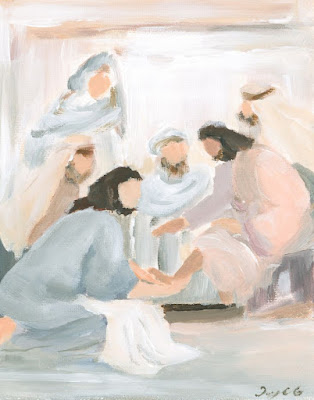The Friendship Love of John 15
According to People-Who-Know, our online attention span is hanging right around 8 seconds.
I am acutely aware this doesn't bode well for the success of a lengthier series such as this one! (if you're a new reader and wish to start at the beginning, the introduction lives here.) Gifting this topic the care it deserves takes a bit longer than 8 seconds (a casual read-through lands you more around 10 minutes) but I'm hopeful you will give it a chance, regardless. I am also optimistic. Slanted surely in my favor, are the odds that readers showing up in this space possess above-average attention spans. I pray these words meet you where you are and inspire your heart toward genuine connection.
-------------------------------------
When attempting to deep-dive a topic, can we first embrace the notion that defining our terms is a most important exercise?
How many misunderstandings could be navigated more smoothly (or perhaps avoided entirely) if only we stopped talking past each other, and instead slowed down to clarify our language? Our words are nuanced and curious creatures, and we fool only ourselves if we think baggage isn't something that sentences can carry. So in an attempt to stay on the trail (and out of the rhubarb) let us first consult Merriam:
Friend: a person whom one knows and with whom one has a bond of mutual affection.
Social life: the part of a person's time spent doing enjoyable things with others
How often and how easily is the buzz of social life mistaken for the presence of genuine friendship?
I think this question deserves our consideration.(at least for 10 minutes) Perhaps even more so, given the interconnected nature of our Mennonite realm. A passing glance could likely convince us social life comes part and parcel with real friendship.
But a closer inspection reveals the scores of ways in which they might have less in common than we first imagine. Intimate friends likely will do enjoyable things together, but by no means should we consider that the primary fuel for the friendship long-haul. Our souls are created to crave more than simply shared activity.
To those who feel most alive on a solo walk or who bask in the glory of a quieted house--the blurry world of crowds and conversation is enough to send us scurrying. If that is the sustenance on which real friendships feed, count us out. We shall get a dog.
On the opposite end of spectrum, we find those who embrace the endless array of organizing outings and gathering groups. They are the life of the party, belle-of-the-ball, and we both envy and admire the ease with which they swim through social waters. But extroverts may also be the souls for whom the complexities of life hit with overwhelming reality in the morning. Leaving them to feel adrift, alone, and lacking a rootedness to others that extends beyond the ending of an evening.
If our preferences toward social situations are not the key to deciphering friendships in adulthood, how then do we crack the code to authentic connection? And why are these relationships worth careful investment of my time and efforts?
The best example for our purposes here is twelve rather dubious disciples. Bound together in "one another" love by the One whom they followed. They're honestly quite a crew.
It gets weirder when we examine the fact that except for the call of Jesus upon their life, the chance that Matthew the tax collector would choose to be buddies with Simon the Zealot, hovers somewhere around....zero. The women we see closest to Jesus, and who were devoted to supporting his ministry, tell a similar tale. Joanna, the wife of Herod's steward comes with significant social status. She's seen hanging tight with Mary Magdalene whose own past is not exactly stellar. Both have been healed by Jesus, both drawn to him, then bound together. (Luke 8:1-3)
Here we see their story: moving around the country, in each other's space. Breaking bread, passing cups, sharing fish. Mingling tears and awe. Supporting in small ways the big work of a fledgling faith. Believing this unlikely Messiah--and in the process building friendships with other improbable apostles.
Doubtless they had their share of frustrations. A multi-year road trip, even among my dearest friends, is a recipe for drama. But when faced with all their differences, I'm guessing Jesus made the difference.
To eavesdrop on the meal of Jesus and his closest friends in the fifteenth chapter of John, is to catch a glimpse of Jesus's very heart for the future relationships of his disciples.
"This is my commandment, that you love one another as I have loved you. Greater love has no one than this, that someone lay down his life for his friends." (John 15:12-13)
"These things I command you, so that you will love one another." (John 15:17)
The thing not easily apparent to readers of English translations, is the specific language Jesus uses when referring to this friendship love. The Greek word agape is translated to us as merely "love"--a word we apply to both spouse and steak--assuming that others will work out what we mean. But the original language leaves no such room for hazy interpretation.
Agape at its core is a love marked by selflessness. It is unconditional and sacrificial and refers to a love that God is as well as a love that God shows. (1 John 4:8, 10, 16, 19 and John 3:16)
But when staring into the face of our humanity, the specifics of how this laying down one's life for another plays out, is of course, the million dollar question.
The man called Jesus perfectly embraced this sacrificial love--laying down his life so we could live forever. But we're no Jesus, and there is blessed lack of public executions in the global west, of which I'm pretty sure he is aware. So how do we embody this self-sacrificing love he commands in the cultural moment in which we find ourselves?
The truth that agape love is others-focused is a simple and agreeable statement--until we are reminded of the fact that nearly everything in our world is ready and breathlessly waiting to tell us how important we actually are. My time, my money, my ideas, my energy, my stuff. A self-serving song in the key of me. (And please, do repeat the chorus each time I put forth my efforts.)
To instead ask, "What does love look like in this situation, for this person, at this time?"--is entirely countercultural--and looks a lot like Jesus. Friendship love is not efficient. But it is a way we image Christ; to reflect the gracious, generous, and genuine sacrifice of the Son.
As believers begin to feel its weighty importance, let us never veer towards the view that agape love is dull, dutiful, or lacking in heartfelt emotion. It is nothing of the sort.
Holy doesn't mean boring, and Christian duty is a dry definition for the picture we see painted throughout the gospels---or writ large across early church letters. These friendships are patterned not only sacrificial, but deeply beautiful. Warm and personal.
Post-resurrection Jesus wasn't too spiritual to meet his friends for breakfast on the beach. While sharing bread and frying fish, he also tackles a hard conversation with the friend who previously turned his back--restoring with three-fold affirmation the friendship thrice denied earlier. Time spent, food served, love affirmed, relationship strengthened.
John clearly felt close enough to Jesus to "lean against his bosom" while sharing that famous supper--and John 5 states with bold clarity: "Now Jesus loved Martha, and her sister, and Lazarus."
It is indisputable that Jesus loved everyone he encountered. Both children's songs and timeless hymns have cemented that fact securely. We are called to love the same. But while we need a loving community of many, we also need closer connection with a few. Though we have differing levels of capacity and need, all of us will thrive best with a variety of friendships.
In Paul's letter to Philemon, he writes this:
"For I have derived much joy and comfort from your love, my brother, because the hearts of the saints have been refreshed through you."
As Paul continues on, he mentions Onesimus, for whom he is appealing:
"I am sending him back to you, sending my very heart." (Philemon 1:7, 12)
This is not an isolated incident. Those greetings and benedictions you often skip when reading a New Testament letter? They're a gold mine of rich clues on the authentic nature of first century Christian friendship!
The swelling doctrinal chords of Paul's letter to the Romans also end with a flurry of emotional personal messages. It is helpful to note that while he first greets an entire church, he also mentions (with warmth and intimacy) the specific individuals with whom he shares a closer connection.
"Greet Prisca and Aquila, my fellow workers in Christ Jesus, who risked their necks for my life"
(16:3-4)
"Greet my beloved Epaenetus" (16:5a)
"Greet Ampliatus, my beloved in the Lord." (16:8)
"Greet the beloved Persis, who has worked hard in the Lord." (16:12b)
"Greet Rufus, chosen in the Lord; also his mother, who has been a mother to me as well"
(16:13)
I'm only skimming the surface here, but I do hope to inspire your digging through the epistles. The message on display is bold and unashamed.
We need not smother or strive for intimate relationships with everyone. Nor should we grasp tightly to only an exclusive few. The friends with whom we feel most closely bonded should be cause for our growth and encouragement. In turn, we can better seek the needs of those on the margins, drawing them in with interest and compassion--asking Jesus to multiply our care into a ripple effect where each small sacrifice and meaningful interaction affects another.
If we begin to feel our closest friendships do not refresh us, or even hinder (rather than inspire faithful love towards others) we do well to consider why. Sometimes an honest conversation should be had about our tendencies toward gazing only inward. Confession is truly good for the soul--and it binds my heart to friends more closely than a hundred social interactions.
Without Jesus, the chances of my finding this kind of vulnerable community is so much like Simon-- somewhere around...zero. It's impossible for any of us. Without him at the center, we are anxious little creatures who are prone to idolize or abandon. Who lean into the guilty satisfaction of leaving others out, or promote ourselves while pretending to care.
But with Jesus as our source and center--the shaper of our thoughts and sculptor of our souls--we find our lives uniquely marked by renewed affection. Agape love. Ripples expanding outward and spreading the Light within. Bearing each other's burdens, fulfilling the law of Christ.
"By this all people will know that you are my disciples, if you have love for one another."
(John 13:35)
---------------------------
I see you there--taking ten whole minutes and defying the distraction odds! I'm eager to hear your thoughts and thankful for your presence.
Last Week: Friendship For Us All: An Introduction
Up Next: Fully Known, Truly Loved (vulnerability + transparency)
"






The first part of this piece (social interaction) had me saying yes, yes! The rest of it gave me much to muse over. I may have to refer back to this at times.
ReplyDeleteI appreciate your unflinching honesty. Your feedback is not taken for granted!
DeleteI'm sure thankful you didn't stick to an 8 second blurb! Love this thoughtful writing.
ReplyDeleteWhat a lovely compliment. It's a pleasure to have you here.
Delete‘how do we crack the code to authentic connection’…I love your words and this message really speaks to me
ReplyDeleteThanks for taking the time to read along 💓
DeleteI truly connected a lot with what you were writing and it’s also given me lots to think about… who of us doesn’t need more help in this area! love your posts ..
ReplyDeleteSuch encouraging words. ✨ Thanks for being here.
Delete